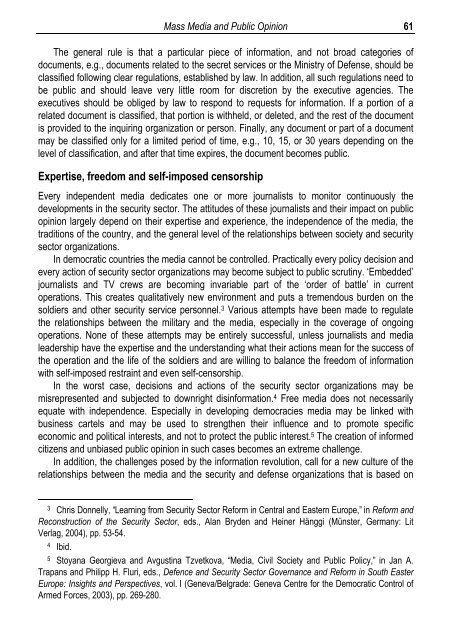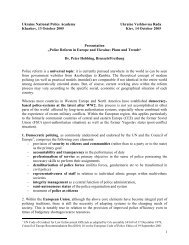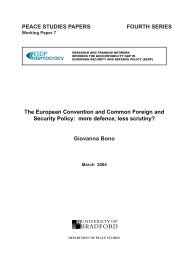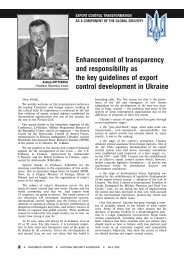Civil-Military Relations and Democratic Control of the Security Sector
Civil-Military Relations and Democratic Control of the Security Sector
Civil-Military Relations and Democratic Control of the Security Sector
You also want an ePaper? Increase the reach of your titles
YUMPU automatically turns print PDFs into web optimized ePapers that Google loves.
Mass Media <strong>and</strong> Public Opinion<br />
The general rule is that a particular piece <strong>of</strong> information, <strong>and</strong> not broad categories <strong>of</strong><br />
documents, e.g., documents related to <strong>the</strong> secret services or <strong>the</strong> Ministry <strong>of</strong> Defense, should be<br />
classified following clear regulations, established by law. In addition, all such regulations need to<br />
be public <strong>and</strong> should leave very little room for discretion by <strong>the</strong> executive agencies. The<br />
executives should be obliged by law to respond to requests for information. If a portion <strong>of</strong> a<br />
related document is classified, that portion is withheld, or deleted, <strong>and</strong> <strong>the</strong> rest <strong>of</strong> <strong>the</strong> document<br />
is provided to <strong>the</strong> inquiring organization or person. Finally, any document or part <strong>of</strong> a document<br />
may be classified only for a limited period <strong>of</strong> time, e.g., 10, 15, or 30 years depending on <strong>the</strong><br />
level <strong>of</strong> classification, <strong>and</strong> after that time expires, <strong>the</strong> document becomes public.<br />
Expertise, freedom <strong>and</strong> self-imposed censorship<br />
Every independent media dedicates one or more journalists to monitor continuously <strong>the</strong><br />
developments in <strong>the</strong> security sector. The attitudes <strong>of</strong> <strong>the</strong>se journalists <strong>and</strong> <strong>the</strong>ir impact on public<br />
opinion largely depend on <strong>the</strong>ir expertise <strong>and</strong> experience, <strong>the</strong> independence <strong>of</strong> <strong>the</strong> media, <strong>the</strong><br />
traditions <strong>of</strong> <strong>the</strong> country, <strong>and</strong> <strong>the</strong> general level <strong>of</strong> <strong>the</strong> relationships between society <strong>and</strong> security<br />
sector organizations.<br />
In democratic countries <strong>the</strong> media cannot be controlled. Practically every policy decision <strong>and</strong><br />
every action <strong>of</strong> security sector organizations may become subject to public scrutiny. ‘Embedded’<br />
journalists <strong>and</strong> TV crews are becoming invariable part <strong>of</strong> <strong>the</strong> ‘order <strong>of</strong> battle’ in current<br />
operations. This creates qualitatively new environment <strong>and</strong> puts a tremendous burden on <strong>the</strong><br />
soldiers <strong>and</strong> o<strong>the</strong>r security service personnel. 3 Various attempts have been made to regulate<br />
<strong>the</strong> relationships between <strong>the</strong> military <strong>and</strong> <strong>the</strong> media, especially in <strong>the</strong> coverage <strong>of</strong> ongoing<br />
operations. None <strong>of</strong> <strong>the</strong>se attempts may be entirely successful, unless journalists <strong>and</strong> media<br />
leadership have <strong>the</strong> expertise <strong>and</strong> <strong>the</strong> underst<strong>and</strong>ing what <strong>the</strong>ir actions mean for <strong>the</strong> success <strong>of</strong><br />
<strong>the</strong> operation <strong>and</strong> <strong>the</strong> life <strong>of</strong> <strong>the</strong> soldiers <strong>and</strong> are willing to balance <strong>the</strong> freedom <strong>of</strong> information<br />
with self-imposed restraint <strong>and</strong> even self-censorship.<br />
In <strong>the</strong> worst case, decisions <strong>and</strong> actions <strong>of</strong> <strong>the</strong> security sector organizations may be<br />
misrepresented <strong>and</strong> subjected to downright disinformation. 4 Free media does not necessarily<br />
equate with independence. Especially in developing democracies media may be linked with<br />
business cartels <strong>and</strong> may be used to streng<strong>the</strong>n <strong>the</strong>ir influence <strong>and</strong> to promote specific<br />
economic <strong>and</strong> political interests, <strong>and</strong> not to protect <strong>the</strong> public interest. 5 The creation <strong>of</strong> informed<br />
citizens <strong>and</strong> unbiased public opinion in such cases becomes an extreme challenge.<br />
In addition, <strong>the</strong> challenges posed by <strong>the</strong> information revolution, call for a new culture <strong>of</strong> <strong>the</strong><br />
relationships between <strong>the</strong> media <strong>and</strong> <strong>the</strong> security <strong>and</strong> defense organizations that is based on<br />
3 Chris Donnelly, “Learning from <strong>Security</strong> <strong>Sector</strong> Reform in Central <strong>and</strong> Eastern Europe,” in Reform <strong>and</strong><br />
Reconstruction <strong>of</strong> <strong>the</strong> <strong>Security</strong> <strong>Sector</strong>, eds., Alan Bryden <strong>and</strong> Heiner Hänggi (Münster, Germany: Lit<br />
Verlag, 2004), pp. 53-54.<br />
4 Ibid.<br />
5 Stoyana Georgieva <strong>and</strong> Avgustina Tzvetkova, “Media, <strong>Civil</strong> Society <strong>and</strong> Public Policy,” in Jan A.<br />
Trapans <strong>and</strong> Philipp H. Fluri, eds., Defence <strong>and</strong> <strong>Security</strong> <strong>Sector</strong> Governance <strong>and</strong> Reform in South Easter<br />
Europe: Insights <strong>and</strong> Perspectives, vol. I (Geneva/Belgrade: Geneva Centre for <strong>the</strong> <strong>Democratic</strong> <strong>Control</strong> <strong>of</strong><br />
Armed Forces, 2003), pp. 269-280.<br />
61

















